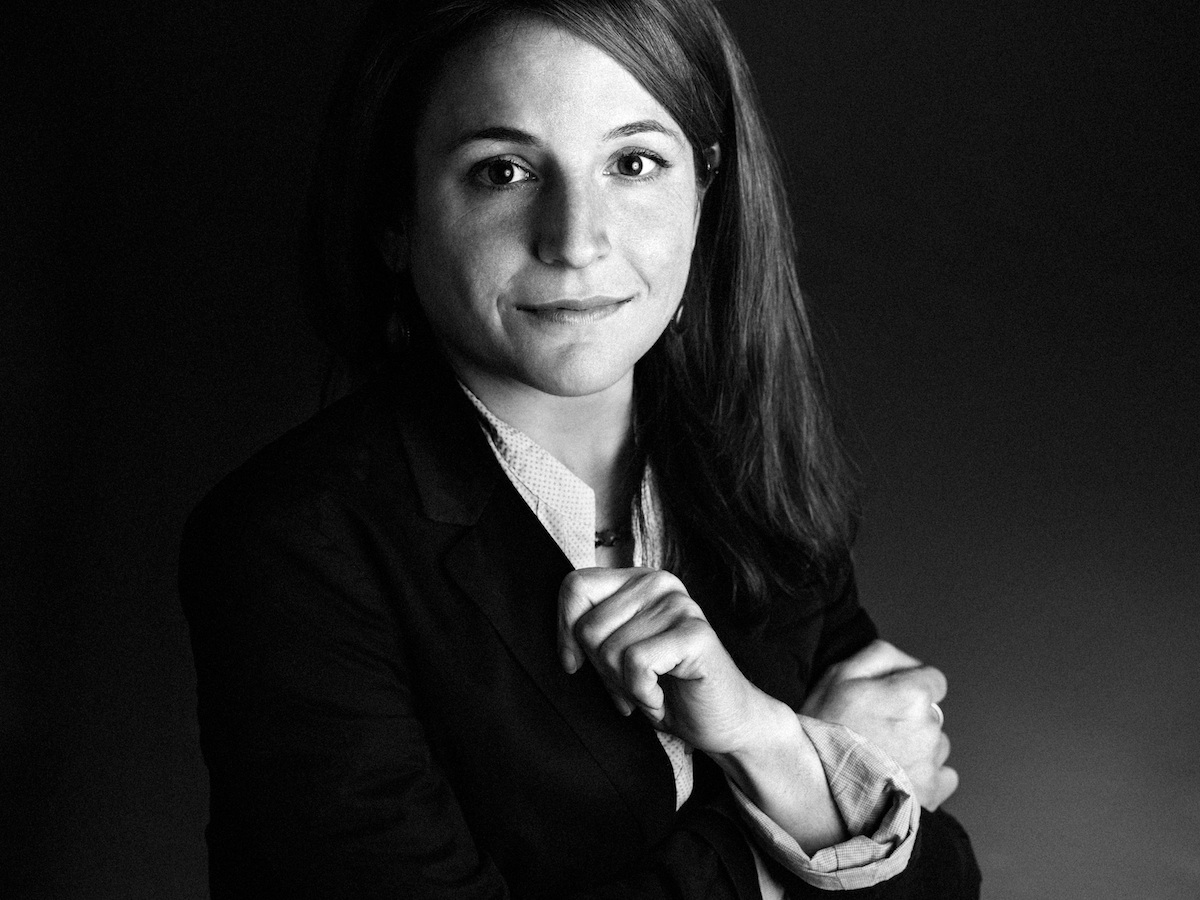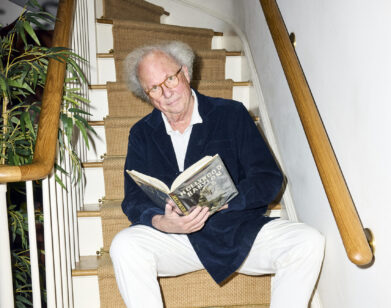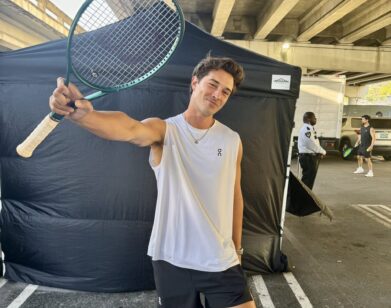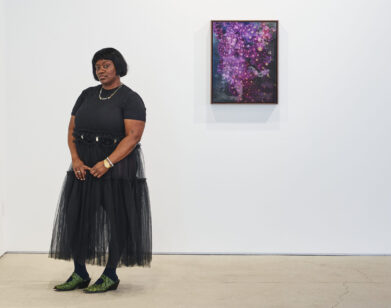The Nature of Karen Russell

ABOVE: KAREN RUSSELL, SHOT AT SUN STUDIOS BY CHRISTOPHER GABELLO
Karen Russell is not the first young writer to merge humanism and monstrosities in her fiction or take imaginative leaps buoyed by such fine writing that the reader follows along with the allegiance of wonder. Mary Shelley began writing Frankenstein at 19 and published the novel at 21. So, in the long hallways of literature, Karen Russell’s accomplishments do have a precedent.
Still, it’s difficult to think of another writer working today who has Russell’s talent for gorgeous, risky prose and a seemingly endless arsenal of odd, inventive narratives. Give her a setting and she’ll grow beautiful monsters in its brilliantly described ecosystem.
Her first collection of short stories, St. Lucy’s Home for Girls Raised by Wolves, took stunning risks in an industry that seems more and more sheltered by the conventions of tidy realism. Her 2011 novel, Swamplandia!, turned readers into instant fans with her treatment of a family battling to save their gator-wrestling theme park from extinction in the gnarled swamps of Florida. Something rare happened: the Pulitzer Prize nomination that she garnered was never once questioned, even for a first-time novelist. To read the first chapter of Swamplandia! is to fall immediately into a universe so rich and strange, so haunted by humans, that it feels like a classic of American legend.
Now Russell returns with her second collection of short stories, Vampires in the Lemon Grove (Knopf), and this time she stretches that golden imagination beyond the humid lagoons of her native state. Russell has created eight new theme parks in her stories; eight new cages of horror and heart and winding metamorphoses that would take a normal writer a lifetime to dream into being. Here schoolyard bullies are met with the scarecrow of one of their weakest victims, young Japanese factory slaves become silkworms in captivity, a vampire couple permanently honeymoons in Italy, and in my favorite story in years, “Proving Up,” a homesteader family struggles through drought and poverty and the ghosts of homesteaders past to earn its land title and make a home from dust. Here is how Russell describes a horse galloping through a blizzard: “a black match head tearing against a wall of snow. It’s a wonder the gales don’t catch alight and burn.” Can reading be like striking a match?
Russell is currently living in Philadelphia, but came to New York for the publication of her book. We ate sushi in a restaurant in SoHo.
CHRISTOPHER BOLLEN: You’re a writer whose work is really rooted in nature—or at least your characters rub up very closely with the natural world. And I know you grew up in Miami. Were you on the water a lot as a kid?
KAREN RUSSELL: My dad is a nautical guy. He was in the Navy and loves it. And it probably brings him great sadness that none of his kids are sailors.
BOLLEN: He didn’t force you onto a boat as a child?
RUSSELL: We went out on the boat a lot. I really liked the sea, but I was just kind of bad at sailing. There’s a lot of blooper reel of me catching a stingray and having it slap my face, you know? Slapstick nature. Falling out of the boat or failing to bait a hook. But I did make them send me to a one-week sailing camp, because I never got to go to camp.
BOLLEN: Me neither! I saw too many horror movies as a little kid, and I was too terrified to go to camp.
RUSSELL: Yeah, what’s going to happen in your cabin? Nothing great. When your first contact of camp is horror stories, you aren’t going to appreciate the dating possibilities, right? Cabins are not a place to let your guard down.
BOLLEN: Sailing camp might have been the safer option for me.
RUSSELL: We went to sailing camp for one week. It was through the Miami Museum of Science, and they put my younger sister and me on this boat with a kid who spoke no English, and then there was a kid with him to translate.
BOLLEN: Weird. He brought his own kid as a translator at kid camp?
RUSSELL: Yeah, it was a weird kid boat. It really was a week of horror. I remember we had a swim test, and my sister had long, beautiful blond hair. Do you know how you acutely remember those moments of kid cowardice? And the guilt is still there no matter how years have elapsed. We had to tread water for five minutes in the bay, and my sister’s gorgeous tresses got slick with oil and fish, and I just swam away from her.
BOLLEN: You didn’t come to her aid? [laughs]
RUSSELL: Let that be your first impression of me. I’m a monster of self-interest.
BOLLEN: You swim away when people are in trouble. But I think I would have probably done the same thing. But my sister is older, so she never depended on me.
RUSSELL: It was a tough sister moment. But what I discovered from that week was that I was really bad at sailing and predicting the wind. I do like eating KFC on a boat.
BOLLEN: I once was on a boat in Miami and they took us an hour out to the place called Stiltsville, where old houses are just hanging on stilts in the middle of the ocean. It was beautiful.
RUSSELL: I snuck Stiltsville into Swamplandia! I always get false credit for inventing the places that are literally out there. I must sheepishly confess that you can set your GPS to Stiltsville and see those beautiful barnacled roofs.
BOLLEN: I couldn’t tell what was geographically real or unreal in Swamplandia! I guess that’s part of the magic. Is there an island like this off the mainland? Could a boat make that voyage?
RUSSELL: The contours are right. There’s the Gulf side of the swamp, and Loomis [County] is sort of cast off a little. But there’s really nowhere where there could be this isolated theme park where you could take a 40-minute ferry ride and be in downtown Miami. That was my own fantasy of some umbilical that would be possible between the island and the mainland.
BOLLEN: Do you find that Miami or Florida has a different reaction to Swamplandia! than the rest of the country?
RUSSELL: It’s funny, I just came back from Miami yesterday. It just gets a different reception down there. There’s less of a fantasy to it down there. Everyone sort of wants to come and tell me about the roadside attractions they went to, or do I remember the Miami Serpentarium?
BOLLEN: I wanted to tell you about the time I drove to the Everglades and took one of those alligator tours on an airboat.
RUSSELL: Are you still bleeding out of your ears?
BOLLEN: [laughs.] I actually really loved it. And the weirdest things happened. There was a family from the Midwest on my boat, and they had forgotten their camera, so I said I’d take pictures of them and email them. So throughout the tour we got to talking and it turned out they were from Ohio, where I am from. And then at the end, after I took all these portraits of them with the gators in the background, they gave me their card for me to email them, and their last name was Bollen. They were also Bollens from Ohio. We honestly must have been related.
RUSSELL: That’s too weird. What a place to meet in this primordial muck. On an airboat.
BOLLEN: I do think there is something magical about that area. And I loved the airboats.
RUSSELL: I like that those boats are still at the forefront of technology. A tiny boat with an airplane engine. It’s a deafening ship. When we went on field trips as a kid, we’d put cotton balls in our ears. And we had to sign a waiver. It’s funny to watch tourists who at first want to see one gator and their excitement extenuates as they begin to see literally majillions of gators and they so quickly become inured. First you’re freaking out, and 45 minutes later, you’re like, “Whatever. I want to see a great blue heron.”
BOLLEN: We’re supposed to be talking about the new book. Did I just do what you must get all the time? The “I went to Florida and saw an alligator” story? I’m sorry!
RUSSELL: No, no, no, no. I like it, I still like it.
BOLLEN: Do you feel that because of Swamplandia!‘s success, you have inadvertently become a regional writer? Even though you don’t live in Florida anymore.
RUSSELL: I’ve decided I’m just not the authority on my own feelings at this moment, you know what I mean? I’m ostensibly trying to describe the interior worlds of my characters. And when I’m asking, “How does XYZ feel?” I’m like, “I don’t know. I’m thirsty, though.” [Bollen laughs.] But I will say that with this collection of short stories it was exciting in a really conscious way to leave Florida. Which felt kind of risky. Because up until then, most of what I wrote was set in Florida. It’s the landscape of my childhood and, although it’s never easy to write, it’s a productive landscape for me because I can really mine whatever deep emotional attachment I have to things like the mangroves. Or alligators, even. I’m sure for you in the Midwest, you have your own lexicon of images and symbols.
BOLLEN: Yeah. When I think of nature, my mind instinctively thinks of the birds and trees of Southern Ohio.
RUSSELL: It’s sort of innate. If you’re going to conjure up some kind of landscape, that would be your stock footage. For me, it’s the cormorant and the mangroves at the end of my street. And you feel like you have a license to imagine something on top of this stock footage. So the stories in Vampires in the Lemon Grove were a little trickier because some of them are set in the past, some are set in different states and countries…
BOLLEN: I have to say, your story set in 19th-century Nebraska, “Proving Up,” is one of the best short stories I’ve read in the past decade. It had this gorgeous Willa Cather-like attention to the scenery and characters on this merciless frontier land.
RUSSELL: Frontiers are always interesting. For the story that I did a million years ago when my first collection came out about this minotaur who pulls his family to the west, I just happened to have picked up this book called Women’s Diaries of the Westward Journey. There’s something about the stoic acceptance of these women at the most brutal losses. It almost doesn’t seem possible, like it’s an artifact of a different way of being in this world. It feels very foreign to me, their toughness. You could lose five children and have that sort of resilience. There’s something of a horror story in it for me too—what you can endure and survive. It’s Book of Job style. There’s a situation that is absolutely unlivable, intolerable, and yet your body continues. I feel like such a sap in so many ways. I’m terrified of losing my loved ones. So there is almost this morbid fascination and respect for what these people were able to absorb and continue existing.
BOLLEN: In “Proving Up,” the family is hoping to be approved for a land section title from the inspector, and of course they are desperate for land that’s mostly unlivable. It’s sort of a torture of commitment.
RUSSELL: If you’ve buried three of your children on that land, and you’re mortgaged up to your eyeballs, what’s the tipping point after all you’ve sacrificed? Whatever dream that brought them out there had become so nightmarish, and yet there was a commitment to that land.
BOLLEN: I liked that one of the conditions of receiving a title was having a glass window in the home. The whole story revolves around the glass window shared among the neighbors to “prove up.”
RUSSELL: On the one hand, the idea that it exists in the legislation seems so arbitrary. But to make a window a prerequisite for a house to become a home was also so metaphorically terrific. There’s something about having a transparent membrane of seeing in and seeing out and being part of this community. And I liked the idea of something being in glass as being so rare that it becomes a luxury commodity, and this community is swapping it around, in a way, like a fragile unity.
BOLLEN: There’s an actual murderer on the loose in “Proving Up.” How did you dream up this ghostly killer?
RUSSELL: In an earlier draft, the zombie homesteader was more of a tragicomic figure. He’s much more terrifying now. In the earlier draft, I had this strange compassion for whatever the figure represents. I was thinking about a hope that outlasts any possibility of its fulfillment, this undead hope in a landscape that just completely inhospitable to it, this hope that has kind of gone rancid and killed its host and killed anything the host cared about and continues to. I must be obsessed with stories of people in conflict or deep mismatch with nature, because it comes up in Swamplandia! too. I was working on that novel while all of these dream communities in Florida were foreclosing. They were what is called arrested developments. There would be a beautiful gate to a place like “Paradise, Florida” and the gate would lead nowhere, just to a half-built development. So in a way it isn’t as if “Proving Up” isn’t a contemporary story with the same kind of blind delusional optimism. The dream of owning a home or owning land is still somehow part of our mythos.
BOLLEN: In a way, every story in the collection could be read as a story in the horror genre, with a lot of toying with or reworking the conventions. When I was reading the book at a diner, my gothy waitress looked at the cover and said, “Oh, are you really into vampires?” And I was surprised by my own reaction. I felt some strange need to tell her that this book isn’t part of the Twilight series. Or I’m not just reading teen death-romance books.
RUSSELL: That’s been an interesting problem. [laughs.]
BOLLEN: Are you a big horror reader? Or were you as a child?
RUSSELL: I loved horror when I was a kid, in an embarrassed way, because I got the sense early on that that wasn’t literary, and that there was something discomfiting to adults, that you were interested in books like Cujo.
BOLLEN: It’s funny how you start to understand that adults could read you as a creepy kid.
RUSSELL: Yeah! Exactly. But for me it wasn’t specifically horror. I would read a lot of sci-fi fantasy stuff, too. But if I wanted a book with some kind of genre sticker on it, I would also have to get something more literary, like the kids’ abridged Grapes of Wrath.
BOLLEN: Or To Kill a Mockingbird, which is also a sort of monster story in its way, with Boo Radley.
RUSSELL: And the way that kids will embroider that figure on the margins until he becomes this bogeyman. And how you’re kind of left to do that private arithmetic as a kid. Adults are so discreet, they never help you understand that face in the window.
BOLLEN: I’m glad you mentioned reading Cujo. I love Stephen King.
RUSSELL: Me too. I love him a lot. It’s funny to think how persuasive his influence actually is. I had an English teacher at this Catholic elementary school who was so sweet, a cardigan, sweetheart, and she loved Tony Hillerman mysteries and Michael Crichton—not Stephen King so much. But some of the stuff she would lend to me was exciting, because this is an adult I respected and not someone you would identify in a police lineup as the woman with an appetite for strangeness and darkness.
BOLLEN: It’s probably even more fraught that she’s giving those kinds of book to a girl and not to a boy. I feel like it is more acceptable for a boy to be curious about gore and murder.
RUSSELL: I could not read any of those sanitized books for girls, like the Sweet Valley twins. I just had no way in there.
BOLLEN: My sister read those books.
RUSSELL: It’s amazing to think about being so young and how a child’s mind is making sense of those texts. I wish there was some cinematic entry point where adults could actually see how a nine-year-old brain is translating books. Because you’re kind of coasting on fumes, you don’t have a lot of real-world reference points, so it’s the most creative act to even try to create those landscapes of dramas. I have no idea what cracked-out vision I must have been conjuring when I was 10.
BOLLEN: I think there was a safety to the world when I was little, and books allowed so many edges into that world, so many opportunities for terror and fear and desire and greed that just wasn’t available to me in Ohio at age nine.
RUSSELL: Yes, and it’s also confirmation of some real ugliness that you’re always aware of when you’re younger but have no vocabulary for. Or to speak it feels too taboo—to admit that you know what’s going on. There’s that strange beautiful impulse to think, “I better protect these adults from my knowledge of what’s actually happening. I have to chloroform my own inner knowledge of what’s happening because it’s too threatening to this really unsteady equilibrium we’ve brokered here.” Whether it’s within the classroom or within the family or wherever.
BOLLEN: And adults are unaware of how aware children are.
RUSSELL: They’re just like, “Kids love this cartoon.” It’s fascinating. Because there is no way to avoid knowing something that you understand is too soon for you to know. I think a lot of childhood is just creating mental containers for violence that you see at a friend’s house or your own house or in a book that you read where it really felt like trespassing, a book could fill you with the same kind of terror-dread as riding your bike somewhere you’re not allowed to go.
BOLLEN: Just from reading all of your work, I sense I’m in the presence of a fellow animal lover. Animals crop up in your fiction a lot. And I find when I look at landscapes, I immediately gravitate toward any animal presence, the way others must gravitate toward the sun or the trees or water. Do you find animals populating your stories almost unconsciously?
RUSSELL: It’s getting to the point that I’m afraid that it might be a tic. You don’t want to become overly reliant on any one thing. In my first book, it would be all “moons and oceans” to the point that it was a relief to have stories set elsewhere, where no one could be besotted by the moon on the water yet again! I wasn’t going to use a bunch of lunar adjectives again. You know, as a reader, I like a New York story. I like a vicious party story as much as the next person. But as a writer, I find animals work to visualize certain emotional states. Like in my seagull story [“The Seagull Army Descends on Strong Beach, 1979”], I was thinking of an image of a ravenous flock. So that worked as an analog for an emotional state.
BOLLEN: For that particular story, where seagulls invade a beach town and steal objects from the population that exist in a separate time—past, present, and future—did the birds come before the plot of the story?
RUSSELL: I had read this André Aciman essay that’s amazing on “mnemonic arbitrage,” which is, among other things, our inability to live in the present and our desire to exploit the difference between the present and the future and to enjoy whatever’s happening right now as a future memory.
BOLLEN: Wow.
RUSSELL: Aciman borrows this financial language to describe this really universal move to launch out of the present. And I was thinking about seagulls as being these cosmic scavengers, or at least the narrator sees them that way, whether it’s happening that way or not. But it’s just this terror of an impersonal appetite. That’s one clear way to see nature and animals. They are part of this frightening, clam, natural order. I think there’s something beautiful and terrifying about that. I think what is sublime about animals is that they’re emissaries from a world that we’re part of, since we’re part of nature too, but there is no way to witness a flock of seagulls or bats and still feel yourself to be the be-all, end-all of the game. Animals are humbling in a good way. They resize our own lives.
BOLLEN: How did you decide on these particular stories for the collection? I see a horror pattern and also a transformational theme, too. Today happens to be Presidents’ Day, and one story involves presidents who are all reborn into the bodies of horses in a stable [“The Barn at the End of Our Term”].
RUSSELL: In a really loose way, it seemed like I was doing something with these monstrous metamorphoses. And some are told from the point of view of, like, the bull or the monster.
BOLLEN: Like “The Graveless Doll of Eric Mutis,” where the narrator is part of the class bully pack.
RUSSELL: I was thinking of our boy Stephen King a lot with that one. He’s so good at these unchaperoned boys.
BOLLEN: Groups of boys are scary.
RUSSELL: Why are they so scary? I think so too. I think just the terrible inertia of boys in groups. Something awful happens to you guys.
BOLLEN: Terrible.
RUSSELL: I’ve seen it with my brother and his goon friends. Some force possesses them. It’s like they are obeying some evil ghost of their own group creation.
BOLLEN: I think girls do it differently, but they’re equally awful.
RUSSELL: Girls are cruel. There’s a sort of slippery, horrified sense—
BOLLEN: A slippery meanness!
RUSSELL: Yeah, it’s often not physical cruelty for girls. It’s social cowardice, or like Kitty Genovese, watching someone get stabbed to death, and you do nothing. That kind of diffusion of responsibility… I think that’s very common among kids. But that story for me, too, was also about substitution, the scarecrow logic whereby a bully or a captor becomes the victim. Or the shallow burial that you can give to your own culpability, which kept coming up in these stories. It wasn’t even conscious; it was just often the force that was giving life to whatever story. I’m always the last to know. When I’m writing, I’m like, “Oh! I see!” [laughs] And in that last story, there is a callback to the title story where they’re saying this kind of quiet, available to them in their shitty, awful urban lives… There’s a sort of stillness and complicity that’s hurting this kid and that’s mysterious to his group, but is also the glue of their friendship. And I think I say, “It’s like blood is to a vampire.” I think so many of these stories end up being about that bloodlust.
BOLLEN: You often write from the point of view of the adolescent. I was going to ask you if you think your understanding of the adolescent would change as you got older, but that’s a dumb question. Of course it will. But it doesn’t mean you will somehow understand it better just because you’re older.
RUSSELL: We’re all just living in a world where you’re required to make some guess about how another body is experiencing time. I kind of love authors who pull a Cate Blanchett and just jump into anybody. For a while I was really self-conscious about that fact. Before my first collection, I was penning stories about 13-year-olds, 14-year-olds… There’s just this sense that when you have an adolescent protagonist, some people will automatically class that as YA. And it doesn’t matter if the view is retrospective, it doesn’t matter if you’re looking back through the tunnel of memory. And it doesn’t matter either if you’re using the kid as an objective lens on adult systems. I get so upset when people say, “Well, this voice doesn’t sound like the voice of a nine-year-old.”
BOLLEN: Reviewers in The New York Times always point that out, like the narrator has to sound exactly like a nine-year-old or else it’s writer duplicity. It’s ridiculous. We are all perfectly aware this book is being written by an adult. Do we want to read a book by a nine-year-old?
RUSSELL: Tell me if you like this, I’ve been trying this one out. “At the expense of one kind of realism, something that comes is emotional realism.” So it feels really true to the experience of being that age, and you have access to adult language to recreate that space. So you’re going to use analogies and metaphors and sophisticated language—in the interest, actually, of recreating a kind of uncanniness and bewilderment that would otherwise be impossible to get down on the page if you limited yourself to a nine-year-old’s vocabulary and perspective. You have to be old enough… You have to reach a certain age to remember what it was like to be a child. [Laughs.]
BOLLEN: Finally, a lot of people have asked you if you felt more pressure with Vampires in the Lemon Grove after the success and Pulitzer Prize nomination of Swamplandia! But for me, I wonder if instead that kind of success might have re-assured you. You don’t have to worry about getting published. You have a far less chance of future rejection. You’ve built an authentic, interested readership. Hasn’t all of that success really operated as a comfort to you?
RUSSELL: That is something I can speak to. It’s a relief. I feel like I have been given this astonishing chance and the industry is so flukey and beautiful books are written that don’t get lofted high enough over the general din. Luck plays a huge role in the whole reception, too. So that was a very good thing. I don’t feel like I’m starting over. That is a nice new evolving feeling—this might really work.
VAMPIRES IN THE LEMON GROVE IS OUT NOW.






